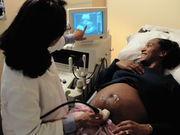Increased early, adequate prenatal care, decreased preterm birth, especially among unmarried women
TUESDAY, Feb. 13, 2018 (HealthDay News) — The Affordable Care Act dependent coverage provision is associated with increased early and adequate prenatal care and decreased preterm births, according to a study published in the Feb. 13 issue of the Journal of the American Medical Association.
Jamie R. Daw, and Benjamin D. Sommers, M.D., Ph.D., from Harvard Medical School in Boston, conducted a retrospective cohort study comparing live births among U.S. women aged 24 to 25 years (exposure group) and 27 to 28 years (control group) before (2009) and after (2011 to 2013) enactment of the dependent coverage provision. Data were included for 1,379,005 births among women aged 24 to 25 years and 1,551,192 births among women aged 27 to 28 years.
The researchers found that, compared with 2009, from 2011 to 2013, there was an increase in private insurance payment for births in the exposure versus the control group and decreases in Medicaid payment and self-payment. There were increases in early and adequate prenatal care and decreases in preterm birth. No significant changes were seen in low birth weight, neonatal intensive care unit admission, or cesarean delivery. The changes in payment for birth, prenatal care, and preterm birth were concentrated among unmarried women in stratified analyses.
“The Affordable Care Act dependent coverage provision was associated with increased private insurance payment for birth, increased use of prenatal care, and modest reduction in preterm births,” the authors write.
Copyright © 2018 HealthDay. All rights reserved.








